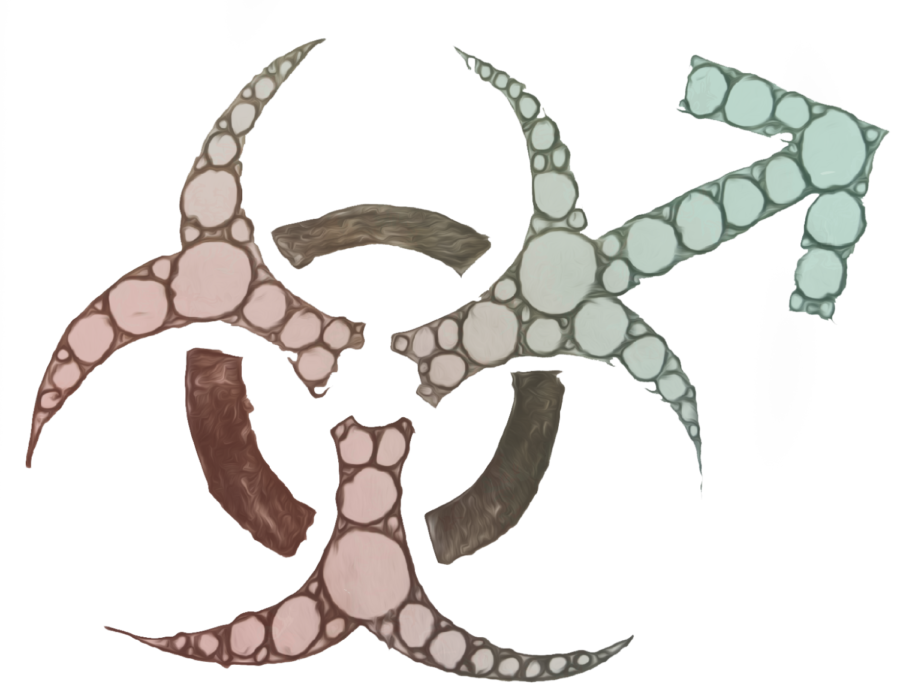Male athletes at Urban discuss sexual harassment
Illustration representing toxic masculinity. Illustration by Kian Nassre, web editor.
In February, male identifying athletes gathered in Urban’s St. Agnes gym with former NFL player Mark Herzlich and wife Danielle Herzlich to discuss respect towards women, and, more specifically, how to support survivors of sexual assault. The meeting was organized by Urban’s Young Men’s Group (YMG) and Clarke Weatherspoon, Urban’s Dean of Equity and Inclusion. The goal of the meeting was to spread the word across the Urban community about how to be allies to survivors of sexual abuse, harassment, and assault.
Tavi De Leon ‘19, one of the co-leaders of YMG and a member of the lacrosse team, said that “it was just important to get boys out to [meetings]—a lot of the forums during Month of Understanding were [populated by] self-identifying young women. It was good to have something that was just a calling for the boys—we advertised it as near mandatory.”
Gus McAllister ‘19, another co-leader of YMG, echoed De Leon’s statements, saying the goal was to “get male athletes to the meeting to have that experience and hear that message.”
The meeting, which was restricted to self-identifying males, was intentionally limited to boys to ensure an open space to share. McAllister said that “[it was valuable that it was restricted to boys] because when women are included, it feels like more of an attack on men, on their masculinity, their values. That’s when people get defensive. Just having boys there was helpful for getting the message across.”
Conor Robbins ‘19, a track runner, expanded upon De Leon’s statement, and said that “Mark was very well spoken…I think there was definitely power in talking about it man-to-man.”
George,* an Urban track runner who asked to remain anonymous, had alternate views on the meeting. “The intended outcome was for the boys to understand what it means to be an ally and to teach other people how to not sexually assault people as well as be an ally to people who have been assaulted and harassed. [However,] I think that was kind of missed because people came in with this [preconceived] idea that people at Urban understand not to sexually assault, but I don’t think that’s true because I know that assault still happens at Urban. I think the discussion should have been more targeted at telling boys not to sexually harass or assault because there are still people [at Urban] who need to learn that.” George* added, “I think there is not that much sexism but I know that assault still happens at Urban—I know people and I know stories. I think the conversation was a little too passive…”
Ben Miller ‘19, the third co-leader of YMG, said that “[the point of the meeting was to] bring awareness to a culture that is often cultivated around sports teams and groups of men, which often supports rape culture—a culture that is the objectification and sexualization of women, where there is a dangerous group mentality towards women.” He added that “by making it for only self-identifying men, it made it stand out more. As opposed to something that was brought to the school, it was something that was brought to the men at Urban, which I think gave it more importance.”
The YMG leaders agreed that the meeting was influential. De Leon said that “it definitely affected a lot of the students there. I think some language has changed just in how I talk to my friends. A lot of the things I talk about in my daily life actually relate to what Mark was talking about [regarding sexual harassment], and just having that on [my] mind has definitely changed [my mentality].”
Despite the changes they’ve noticed, they added that they felt that sexual harassment had never been particularly common at Urban. Miller said, “I don’t think there was a huge existing culture that cultivates that. To start off with, people here are generally a little more aware and more thoughtful, just because it’s Urban, so I wouldn’t say that it was something that was super prevalent before, so it’s kind of hard to tell.”
McAllister agreed, and said “I don’t think our team to begin with exhibits a lot of sexist or toxic behavior. It’s a decent group of guys who keep each other in check.” Though the YMG leaders agree that assault had not been much of a problem before in the Urban community, their opinions are limited to their own perspectives.
Despite the predominantly positive response to the meeting, some students took issue with the approach of the meeting in general.
“Some boys now have an air that it’s fine, and that they’re better than some places, because the problem’s not here. But I think the problem still exists here,” George* added. “It was weird to put it in the context of [just] boys playing sports, because there are a lot of boys who don’t play sports who also need that information.”
As leaders of YMG, De Leon, McAllister, and Miller have set goals for the affinity space that expand upon the topics discussed with Herzlich. De Leon says that “in YMG, we’ve been focusing on your own feelings and how you interact with those around you, and a lot of that has been friendship based. I think moving that self-awareness to educating allies is the next big step in terms of the legacy I want YMG to leave.” McAllister agreed, saying, “I think just keep up the discussion of what it means to be an ally, and keep practicing that.”












